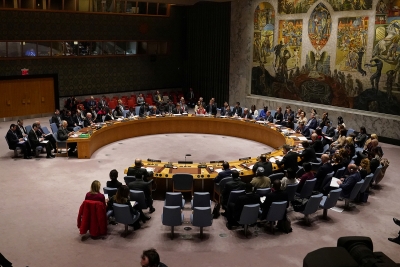
India began its two-year term as a non-permanent member of the United Nations Security Council on January 1, 2021. What is the UNSC? If India is a non permanent member, who are its permanent members? Why has India been stepping up efforts for the reform of the Council? Let’s see.
One of the organs of the UN
The UNSC is one of the six main organs of the United Nations. Its objective is to maintain international peace and security. The UNSC has 15 members, of which, five, China, France, Russia, U.K. and the U.S., are permanent members with veto power (power to withhold assent or reject any resolution). The rest are non-permanent members who are elected to serve a two-year term on the Council. The non-permanent members at present are Estonia, India, Ireland, Kenya, Mexico, Niger, Norway, Saint Vincent and the Grenadines, Tunisia, and Vietnam. As these members do not have veto rights, they are considered powerless. In other words, they cannot assert their view on any issue of international concern.
Empowered to make decisions
Unlike other organs of the UN which can only make recommendations, the Security Council has the power to make decisions, called resolutions, and impose them on member countries. Each member of the Council has one vote. The UNSC may meet whenever there is a threat to peace and security. It first met in January 1946, three months after the United Nations came into existence. Responsible for diplomatically resolving crises and conflicts around the world, the Council can also resort to imposing economic sanctions, travel bans, financial restrictions or authorise the use of force. It seeks to resolve disputes through mediation, special envoys or by sending a UN Mission. It supervises the work of the UN peacekeeping operations.
Criticism against the Council
Although it has been successful in addressing several global issues, it has been criticised for its lack of credibility. It has long been felt that the Security Council in its present form lacks legitimacy, is outdated (reflecting the power centres of 1945) and does not correspond with the changed global realities. It is often said that the Council requires comprehensive reforms to address contemporary challenges, better representation and a strong multilateralism that gives voice to all stakeholders. The exclusive right of the five permanent members of the Council to veto any proposed decision has long been a subject of controversy. Perceived as an undemocratic arrangement, this has been cited as the main reason for UN’s inaction on crimes against humanity.
Quick facts
- India is serving its term as a non-permanent member of the powerful 15-nation UN body for the eighth time. It won 184 of the 192 votes cast in the elections in June 2020 for the five non-permanent seats of the UNSC. A member country requires a two-thirds majority of votes in the General Assembly to become a non permanent member. Besides India, Norway, Kenya, Ireland and Mexico were elected non permanent members in June.
- Counter-terrorism is stated to be India’s priority during its membership. Besides, getting permanent membership is high on the country’s agenda. India will chair the three crucial committees – Taliban and Libya sanctions committees and the Counter Terrorism Committee – of the UNSC during its tenure as a non-permanent member.
- India will be UNSC President in August 2021 and will preside over the Council again for a month in 2022. The presidency of the Council is held for a month by each of the members in turn, as per the alphabetical order of the names of the member countries.
Picture Credit : Google
